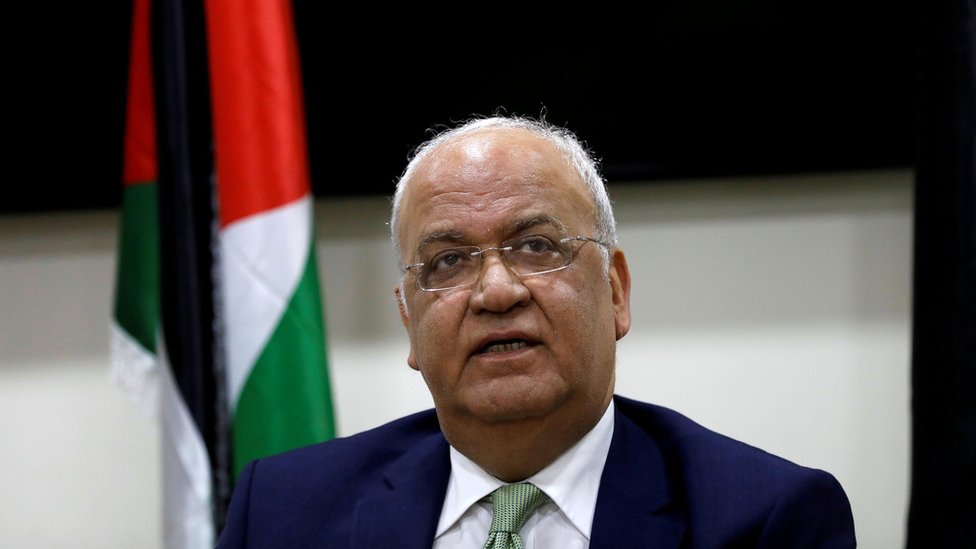JERUSALEM/RAMALLAH, West Bank, (Reuters) – Saeb Erekat, one of the most experienced and high-profile advocates for the Palestinian cause over decades of dispute with Israel, died on Tuesday after contracting COVID-19. He was 65.
Having sat down with Israeli and U.S. leaders in the 1990s and 2000s, in recent years Erekat was the principal face of a war of words with President Donald Trump’s administration over a Middle East plan that envisaged leaving Israel in control of Jewish settlements and large parts of the occupied West Bank.
But after peace talks collapsed in 2014 he remained a firm backer of the negotiated creation of a future Palestinian state co-existing alongside Israel even if, in his own words, it took 50 years.
Erekat, the secretary general of the Palestine Liberation Organization, said on Oct. 8 he had contracted the coronavirus. Three years earlier he had undergone a lung transplant in the United States that left his immune system compromised.
He died following multiple organ failure after being hospitalised for three weeks in Jerusalem’s Hadassah Medical Center, a spokeswoman for the Israeli hospital said. He had required ventilation and specialised drug treatment, she added.
“Saeb has shown an extraordinary patience and resilience, with the same determination that has characterized his career to achieve freedom for Palestine and a just and lasting peace in our region,” his daughter Dalal posted on Twitter.
His funeral is expected to be held on Wednesday in the West Bank city of Jericho.
Fluent in English as well as his native Arabic, Erekat was a spokesman for Palestinian leaders such as Yasser Arafat and Mahmoud Abbas, though never a serious candidate to succeed them.
One of the youngest members of the Palestinian leadership, Erekat was unusual in not having spent decades in exile with Arafat and Abbas, the older generation of his Fatah faction, which dominates the PLO.
Abbas declared three days of mourning, calling his death “a big loss for Palestine and our people”.
“We feel deep sorrow for losing him, especially at such difficult times the Palestinian cause is living through,” Abbas’ office in Ramallah in the occupied West Bank said.
Tzipi Livni, a former Israeli foreign minister, said he had dedicated his life to his people. “Reaching peace is my destiny he used to say. Being sick, he texted me: ‘I’m not finished with what I was born to do’. My deepest condolences to the Palestinians and his family. He will be missed,” she wrote on Twitter.
Well-known in diplomatic circles across the world, he regularly featured in the international media.
But a younger generation of Palestinians disillusioned with a long-stagnant peace process increasingly questioned whether Erekat’s favoured vision of a two-state solution was even possible any more.
Some instead advocated a “one-state solution” of Israelis and Palestinians living side-by-side with equal rights, in a single country.
But having sat opposite Israeli leaders, Erekat regarded the one-state concept as unworkable, aware that Israel would reject it as a demographic liability undermining its ability to be both a Jewish and a democratic state. He maintained a two-state outcome was the solution.
“If not this year, in five years, 10 years, 50 years. But the unfortunate thing is the longer it takes, the more victims, the more people will be killed, the more violence, the more extremism. Saving lives is about going the path of two states, and it is doable,” he told Reuters in July 2019.

